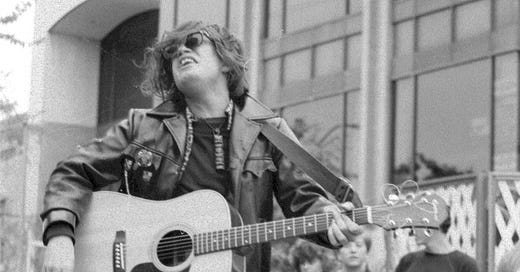The first time I saw Dexter Romweber was in the fall of 1984. Apple Chill, the street festival in Chapel Hill, had just ended. Vendors were breaking down their booths and town workers were dismantling the stage at the intersection of Franklin and Columbia Streets. Suddenly, the roar of a guitar made everyone stop and stare. A guy who looked like he walked off the set of “The Wild One” was, as musician Joe Newberry aptly described, “Singing at the top of his lungs, like someone who had a date to keep at a crossroads.” It was Dexter and his guitar standing in the middle of the street, no entourage. A crowd quickly surrounded him, pitching coins and dollar bills into an open guitar case. I watched, delighted and amazed before walking away.
A few weeks later, I went to a party to hear an up-and-coming band. In a house walking distance to Franklin Street, people spilled out into the yard. The house was packed and in the middle of a dimly lit living room, that guy I had seen on Franklin Street was wailing again, this time with the accompaniment of a drummer. They were the Flat Duo Jets.
A few months later, my brother became their manager. That arrangement didn’t last long, but I’ve known Dexter ever since.
I won’t say I knew him well, but we’ve shared the same haunts for almost 40 years. During COVID, we started walking together, wandering through the empty streets of the town we both called home. We talked about politics and Carrboro and music. Our conversations rarely kept a linear path, often diverging sharply and suddenly into previously untouched topics.
There’s a short 1985 MTV documentary of Dexter from his teenage years. In it, he shows photos taped above his bed of Elvis Presley, Buddy Holly, Gene Vincent, Ritchie Valens, and Little Richard. He has a shrine to “soul brother number one, James Brown.”
In 1990, he played on the David Letterman Show. In the clip, you can see him channelling his heroes, the rhythm of Buddy Holly, the sneer of Elvis, the driving energy of James Brown. He was a tour de force of rock ‘n' roll rage.
Other people have captured the essence and impact of Dexter better than I can. Alex Maiolo describes his influence on other acts, mentioning his time in Athens, Georgia. “If you dig back into your memory you may recall seeing his band, The Flat Duo Jets, when the industry was trying to find a place for them in the alt rock world. It’s hard to steal the show in a film like Athens, GA: Inside Out, when you’re sharing screen time with Pylon and R.E.M., but they did exactly that.”
Jack White of The White Stripes eulogized Dexter on his Instagram page. “He wasn't a Rock N' Roll musician, he WAS Rock N' Roll inside and out, without even having to try, he couldn't help himself...He was the type that don't get 3 course dinners, awards, gold records and statues made of them because they are too real, too much, too strange, too good. Dex was a true tortured romantic, unfairly treated and broken hearted at all times but still hopeful.”
That’s a pretty good reflection. Dex was too raw for the limelight, too quirky for the suits. He would have never made it this long in Los Angeles or New York. He needed the grounding of Carrboro, his family, and the Chapel Hill music scene. As the band Archers of Loaf posted, “Dex's DNA is baked into the music community in Chapel Hill and his influence as an artist reaches far beyond NC.”
Dexter was a townie. He started his career playing frat parties in a college town. He came from a family of musicians who seemed ubiquitous on the music scene for much of the 1980s and 1990s. He was alway approachable, even if he was sometimes indecipherable. As one person posted on Facebook, “Literally everyone has a Dexter story. And isn’t that the way it should be.”
Dex helped create the music scene of the 1980s and 1990s, but he was also a product of the community, a place that values creativity and welcomes the unconventional. West Franklin Street and Carrboro are populated by venues that host artists and musicians who spend more time in smaller rooms than auditoriums or performing arts centers. Somebody like Dex who communicated better through his music than in conversation could find people who understood that his eccentricities and his talent were inseparable. He could walk into a bar unannounced, sit down at the piano, play a song or two, walk out, and nobody would say a word. They would just be glad that he stopped by.
For most of my time here, Dex has been as much a part of the landscape as the Old Well or the Bell Tower. He was a defining figure in a town full of towering talents. I feel lucky to have known him a little bit. I’m glad that I live in a place that could nurture his talent and accept his idiosyncrasies. I just wish he could have stuck around a little bit longer.





Everyone should acknowledge, accept and appreciate the Dexter in their own community. Too often shunned as eccentric, they enrich us all.
Lovely.